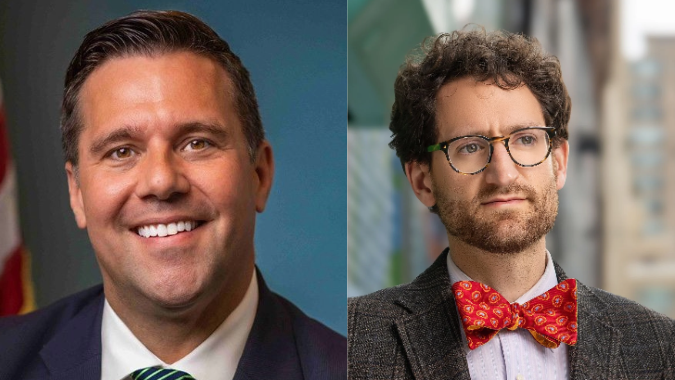When it comes to the Murphy administration’s proposal to limit greenhouse gas emissions, both NJBIA and the environmental community agree – proposed rules by the state's Department of Environmental Protection won’t do much to curb them.
But while the green groups urged more stringent conditions in a four-hour hearing this week, NJBIA’s Vice President of Government Affairs Ray Cantor offered more measured methods that can help the environment and New Jersey’s economy simultaneously.
“Largely, these rules will do little to reduce greenhouse gas emissions or protect citizens but will be costly and highly disruptive of our energy systems and our economy,” Cantor said.
“NJBIA’s position is that we must deeply reduce our carbon emissions, but in a way that is centered on the well-being of humans, not on artificially derived goals, temperature targets, and unrealistic deadlines. And we certainly should not be restructuring our energy and economic systems based on flawed modeling that is premised on implausible scenarios and that ignores observations and the realities of energy markets and physics.”
The Murphy administration continues to be evasive on some of the costs related to its goal of establishing 100% clean energy by 2050, if not inaccurate.
For example, the DEP, which is considering new regulations for boiler permits, said in its initial rule proposal in December that electric boilers would cost between 4.2% and 4.9% more to operate than gas boilers.
This week, the agency issued a correction that operating electric boilers would, in fact, cost between 4.2 and 4.9 times more than gas boilers.
Below is a list of other proposed and anticipated rules by DEP, and the proposals that Cantor delivered to the the agency this week to help improve them with both the environment and the economy in mind.
Proposed Rules
Closure of Natural Gas Electric Generating Units (EGUs) – There are 94 electric generating units in New Jersey powered by carbon-based fuels. Most of them are powered by natural gas, but three f use coal and seven use fuel oil. The PACT rules would set a three-step declining emissions carbon standard that would phase out 66 of these units over the next 13 years (2035), leaving only 28 left operational.
Given the anti-natural gas policies of this Administration, no company is planning new, more efficient plants to replace them. The Oyster Creek Nuclear Generating Plant also recently closed. While solar and wind development is increasing, these are intermittent sources of power that need standby baseload reliable power from natural gas facilities. We are concerned that we are shutting down reliable natural gas facilities at a time when we are also seeking to electrify the transportation and building sectors causing more demand for electricity.
While the PJM grid may be a source of backup power, it actually emits more carbon than most of the facilities being closed. Thus, this proposal will force the importation of dirtier electricity from other states while likely driving up the cost of energy and weakening reliability.
- NJBIA Proposal – While it may be legitimate to seek the closure of our older, dirtier EGUs, of which there are 12, we should not close any more until we are satisfied that we have reliable replacement power that is affordable and that the carbon emissions of the PJM grid will not result in more carbon emissions than the targeted New Jersey sources.
Ban on New Small Gas-Powered Generators – The Department is proposing to ban any new electric boilers of a certain size (1-5 MBTU) from using carbon sources of fuel, such as oil or natural gas. These boilers are generally used in industrial facilities, hospitals, hotels, apartment buildings, and office buildings. Using electric boilers will nearly double the energy costs, require the use of boilers that have a significantly shorter useful life, and that will result in higher carbon emissions for the next 10 to 20 years, at least.
- NJBIA Proposal – This rule should not be adopted until such time as the PJM grid provides electricity with a lower carbon intensity than would result from these gas-powered generators. Incentives should be in place to encourage the use of electric boilers until such a time when these units are cost effective.
Banning on #4 and #6 Fuel Oil – While these fuels are not used much, if at all, in New Jersey beyond marine transportation (which is exempted in the proposal), we have a concern with the Department banning a whole category of fuel. This has never been done before in New Jersey and, in fact, we are not aware of any other state that has banned fuels from being used.
We are also concerned that it sets a precedent for banning other fuels that are significantly in use, such as #2 fuel oil, propane, and natural gas. Moreover, the proposal would also ban the storage of these fuels in New Jersey, even if they are not consumed in the state. Such a ban prevents New Jersey refiners from selling these fuels in other jurisdictions and from using these fuels to make other products not banned.
- NJBIA Position – This proposal should not be adopted. But at least it should be amended to allow the storage of these fuels in the state.
Designating Carbon as an Air Contaminant – While the air rules had previously considered carbon emissions as an air contaminant, they were not considered as such for the purposes of fees, reporting, permitting, or technology thresholds. Because many facilities emit carbon in large quantities (compared to hazardous or criteria pollutants), treating carbon like any other air contaminant will treat thousands of smaller facilities, including schools, apartment buildings, office buildings, and small industrial facilities as if they were major sources of pollution subjecting them to onerous Title V permitting requirements and imposing large permitting fees.
- NJBIA Position – While the Department may want to impose greater restrictions on carbon emissions, they must do so in a way that does not bring thousands of facilities into costly permitting and fee requirements.
Marine Cargo Equipment – The Department has imposed a rule to require the electrification of portable marine cargo equipment at our ports and intermodal rail yards. This rule will require this equipment to be retrofitted or discarded within certain short timeframes. It applies not only to the port owners, mostly governmental entities, but also to lessees of those owners who are mostly privately owned.
- NJBIA Position – NJBIA recognizes that the major ports already have plans in place to facilitate the conversion of their equipment to non-carbon sources of power. We also recognize that there have been some limited sources of funding for these projects. NJBIA would support greater financial incentives for these conversions and a greater length of time to comply.
Anticipated Rules
Land Use Regulations – The Department announced that they plan to propose a major re-writing of their flood and coastal rules (1000 pages anticipated). These changes will, in part, 1) assume a 5-foot sea level rise and increased rainfall by 2100 and regulate applicants today based on those standards; 2) require permits be issued for dozens of activities thought for decades to have been so minor as to not require an actual permit; and 3) impose significant requirements on urban development which may make redevelopment much more costly if not impossible.
The sea level rise projections are based on a single, outdated report not reflective of current scientific thought or plausible projections. The changes to the minor permitting standards will result in thousands of additional permits being issued each year, many of them for activities in residential backyards. The urban stormwater changes will likely have little impact on existing conditions as it will only impact new and redevelopment but may serve as a major disincentive to such urban redevelopment.
- NJBIA Position – Sea level rise scenarios should be based on the latest science based on plausible scenarios. This will likely result in projects of a 2-foot sea level rise, not five. Similarly, rainfall assumptions do not justify using 500-year flood projections to regulate development. Increased rainfall has less to do with localized flooding than adequate stormwater facilities. Areas in vulnerable flood zones should be purchased through the Blue Acres program. The Department should also not expand permitting requirements to minor projects but should instead seek efficiencies in permitting programs that only require approvals if the impacts warrant it. Urban redevelopment should be encouraged in an appropriate manner that results in economic growth and an improved environment.
Omnibus Low NOx Rule – The Department is contemplating an enhanced NOx rule for trucks by adopting the California Omnibus Low NOx rule. This is a companion rule to the ACT rule which will greatly increase the cost of trucks in this state. This rule is not feasible or cost effective. While NOx is an issue in New Jersey, given that we are not fully in compliance with recently enhanced federal ozone standards, our air quality is significantly better than California’s, which has the worst ozone problem in the nation, and which is the reason they have adopted such a stringent rule. Further, most of New Jersey’s NOx, and thus ozone, problems come for other states with less stringent emission standards. Thus, while this rule will impose substantial costs on New Jersey businesses, it will not solve our ozone issues, but further make us uncompetitive with other states who are causing our problems.
- NJBIA Position – New Jersey is not like California when it comes to ozone problems. We already have in place plans to be attained by the national ozone standards, so these rules are not needed for that purpose. We should not adopt these rules but should rather focus our resources on forcing other states, whose air pollution travels into New Jersey, to clean up their sources of air pollution.




